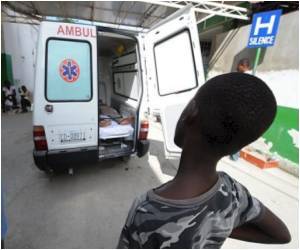A $2.2 billion appeal for a campaign to halt a cholera epidemic in Haiti has been launched by the United Nations.

Ban did not mention the cause of the epidemic, allegedly a camp of Nepalese peacekeepers in the town of Mirebalais, as he called for huge international financing to counter the bacterial disease.
UN officials said 70 percent of the $2.2 billion needed in the next decade would be used to build water and sanitation facilities. Ban said the UN would also buy quantities of a new oral vaccine.
He said $500 million would be needed in the next two years, with $215 million already raised from donor countries while the United Nations was committing $23.5 million.
Ban said the United Nations has already spent $118 million dollars on its cholera response and that he would campaign to raise more money.
Lawyers for some victims and families of the dead have called on the United Nations to pay hundreds of millions of dollars in compensation and threatened a court case.
Advertisement
Ban acknowledged that the epidemic has "added a heavy rate of suffering on a country already recovering from the largest natural disaster in the history of the western hemisphere."
Advertisement
"The United Nations has a long history in Haiti, many years of partnership in difficult times," Ban said. "Today as ever we are in Haiti for one reason alone: to help the Haitian people make their great country all that it can be."
Haitian Prime Minister Laurent Lamothe backed the UN campaign to "put an end to this terrible disease" and also did not mention the cause.
"We want to reaffirm the political will of the Haitian government to do whatever it takes to eradicate cholera in the country," he said at a ceremony with Ban.
In addition to water and sanitation facilities, the government wanted to build new community centers and employ thousands of health workers, he said.
"This is a noble cause. Cholera has hit us very hard and we feel that with the solidarity of the world, Haiti can and will overcome," he said.
Nigel Fisher, UN humanitarian representative in Haiti, said there has been a dramatic fall in the spread of the epidemic, as the number of new cases dropped to 117,000 this year, with 850 deaths.
Fisher also refused to comment on the cause of the epidemic, saying it was in the hands of UN lawyers.
"Obviously we have all read the various reports in the course of the last two years, many Haitians have made up their minds about what is happening, but I cannot dwell on that," he told reporters.
"My focus is on health care, it is on water and sanitation and it is working with national authorities and other partners to make sure the minimum number of Haitians fall sick, the minimum die and that, as we move forward with this, we will indeed see the elimination of cholera," Fisher said.
Source-AFP











